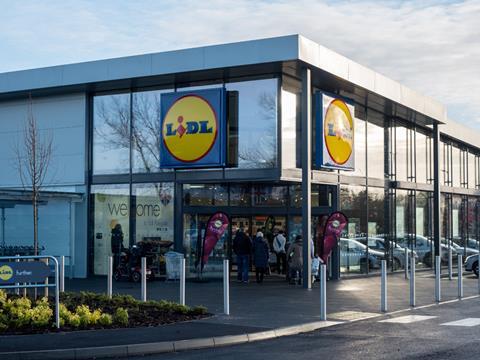
Top story
Shoppers reined in spending at supermarkets following the end of the summer holidays, with £400m less flowing through tills as consumers worried about soaring energy bills and rising food prices, according to new research this morning.
Total till sales growth in the UK slowed from 4.5% last month to 2.5% in the four weeks ended 10 September as shoppers reset spending patterns to deal with the cost-of-living crisis.
NielsenIQ data showed sales at the supermarkets dipped to £2.5bn during the week to 10 September - the lowest level this year since the lull in the week after Easter - meaning £400m less was being spent at supermarkets as shoppers reined in spending at the start of autumn.
As the cost of household bills surged, volumes also fell by -4.4% at the mults over the past 12 weeks.
Lidl remained the fastest-growing retailer in the UK as basket sizes shrank and shopper started to buy little and more often to manage rising grocery bills, Nielsen said.
Sales at Lidl improved by 9.4% in the past 12 weeks.
It follows news last week that Aldi had increased its market share to take away Morrisons’ spot as Britain’s fourth biggest supermarket and a report in The Grocer that Aldi was also taking sales away from Lidl.
Nielsen said the Co-op (+6.9%) followed behind Lidl in terms of fastest growth in the period, with Marks & Spencer (5.5%) and Iceland (5.5%) also recording increases. Asda (5%) was the fastest growing retailer in the ‘big four’ while sales at Morrisons and Waitrose continued to fall. Growth at Aldi came in at 3.7%.
Mike Watkins, NielsenIQ UK head of retailer and business insight, said: “Asda sales have rebounded strongly in recent weeks helped by weak year ago sales, but the retailer has also been attracting new shoppers.
“This suggests that new range initiatives such as Just Essentials and the roll out of Asda Rewards are giving a stronger price perception and now starting to have an impact on sales.”
Promotional spend also continued to flatline, accounting for just 20.9% of all sales in the period - a slight increase from 19.9% last year.
Visits to stores increased by 4.8% in the past four weeks, while online visits declined by 5.3%. This equated to one-million fewer online deliveries than this time last year, with online sales falling 7% compared with the same period last year as a result.
The data also showed online share of fmcg sales declined to 11.1% - down from 11.3% recorded last month and down from 12.3% a year ago as online share normalised following pandemic heights.
Pet & petcare was the fastest growing category over the four weeks with value growth of +12.7%. Meanwhile, there was also strong value growth in soft drinks (+11%). This category was also the only fmcg category to see volume growth (+4.5%).
However, food inflation continued to lift value growth in dairy (+9.3%) and bakery products (+6.9%). There were value sales declines across beers, wines and spirits (-4.5%), fresh produce (-2.3%), and confectionery (-2%).
Watkins added: “With food prices continuing to rise and household energy costs about to jump in October, it’s no surprise that our data shows that 57% of consumers are saying they have been severely or moderately affected by the cost of living crisis, and in three months this is anticipated to rise to 76%.
“With CPI inflation expected to remain close to current levels for the rest of the year, this will encourage households to shop around and to look for savings across different retailers, with shoppers increasingly focussing on the cost of their weekly groceries to help manage personal finances.”
Morning update
Commercial property investor LXi REIT has confirmed it is in talks with Sainsbury’s to buy a portfolio of stores from the supermarket chain for about £500m in a sale-and-leaseback deal.
The estate of 18 stores is predominantly located in the south of England and will be leased back to Sainsbury’s if a deal is agreed.
LXi said this morning in a statement to the London Stock Exchange in response to a Sky News story that it would seek to fund the purchase through a mix of new equity and debt.
The investor is discussing an equity raise with potential investors, but it added that no binding terms had been agreed with Sainsbury’s yet.
“There can be no certainty that the acquisition, or the associated equity raise, will take place,” the statement said.
“A further announcement will be made if and when appropriate.”
LXi added the portfolio of stores benefitted from several defensive characteristics, including “strong trading performance, very low and sustainable indexed rents, long-term ‘green’ leases, low site coverage and modern buildings that provide omni-channel sales optionality”.
Supermarket Income REIT has hailed the strength and resilience of the grocery sector as it unveiled “another set of strong full-year results”.
The group, which invests in supermarket assets, revealed a 34% increase to £77.6m in its annualised passing rent and a 35% jump in pre-tax profits to £110.3m in the year ended 30 June.
Its net assets grew 64% in the period to £1.4bn, with its direct portfolio valued at £1.6bn, a year-on-year increase of £423.2m.
The investor added 12 supermarkets to the portfolio in the year at a combined price of £381m, with a further five assets bought for £216.1m since the year end.
Chairman Nick Hewson said: “This has been another significant year of growth and one in which we achieved the important milestones of being added to the premium segment of the London Stock Exchange and the FTSE 250 index.”
He added: “At a time of considerable unpredictability and uncertainty especially for our economy, we believe our portfolio of targeted, sector specific real estate assets will continue to deliver stable, long-term, and growing income to our shareholders.”
Tesco has appointed Caroline Silver to its board as a non-executive director, starting on 1 October.
Silver, who is currently chairman of PZ Cussons, will also join the group’s audit committee.
As well as her role with PZ Cussons, she is also a non-executive director of Bupa and The Intercontinental Exchange.
Previously she was a trustee of the Victoria and Albert Museum, a non-executive director of Meggitt and M&G, and on the board of the London Ambulance Service NHS Trust.
Silver also spent more than 30 years in the investment banking sector and was most recently a partner and managing director at Moelis & Company. Prior to that she held senior corporate finance and M&A positions at Morgan Stanley and Merrill Lynch after starting her career at PricewaterhouseCoopers, where she qualified as a chartered accountant.
Chairman John Allan said: “[Caroline’s] wealth of experience across a number of commercial, financial and governance roles, together with her investment banking and international experience, will undoubtedly bring additional valuable knowledge and perspective to the board.”
Grocery tech firm Eagle Eye Solutions has revealed a “strong performance” in its latest financial year as it won a host of new contracts and strengthened ties with existing customers.
Group revenues jumped 39% to £31.7m in the year ended 30 June, while adjusted EBITDA soared 54% to £6.5m and a pre-tax profits increased from £100k in the prior period to £700k.
New customer wins in the year included two in the US and Halfords in the UK and Eagle Eye said there was was a “strong” increase in interest in its loyalty offerings by the likes of Asda, Pret a Manger and Pizza Express as they sought to retain consumers.
CEO Tim Mason said he was “incredibly proud” of the successes achieved against a challenging economic backdrop.
“In the current difficult economic environment, customer loyalty and effective promotions are more important than ever. The retail industry is becoming increasingly aware that data driven, personalised promotions are one of the most effective ways to drive increased trade. The ability of our AIR platform to deliver 1:1 marketing, in real time, at an enterprise scale, means we are well positioned to address this growing customer need.
“The prospects for Eagle Eye are increasingly positive and we have entered FY23 in a very strong position with considerable momentum across the business.”
The FTSE 100 opened 0.3% higher to 7,212.26pts this morning.
Shares in LXi REIT moved 0.6% higher to 139.4p on this morning’s news, while Sainsbury’s jumped 1.5% to 197.2p and Tesco rose 1.6% to 227.7p.
Fellow real estate investor also saw a 1.8% jump in value to 116p on its strong results and Eagle Eye Solutions increased 2.6% to 567p.
Other risers included Kerry Group, up 2.1% to €94.62, Science in Sport, up 2% to 26p, McBride, up 1.6% to 24.8p, and C&C Group, up 1.4% to 156.2p.
Fallers so far included Virgin Wines UK, slumping 7.2% to 45p, Delivery Hero, down 3.3% to €41.48, and Just Eat Takeaway, down 2.8% to 1,347p.
Yesterday in the City
The FTSE 100 closed down 0.6% to 7,191.63pts following the bank holiday weekend as the City awaits for an expected rise in interest rates this week.
Haleon shares rose 2.6% to 266.1p after the group posted strong first-half growth in sales and profits in its financial results as a listed company. The stock remains way down on the 330p price it started trading at back in July.
Other risers included Bakkavor, up 2% to 90p, Kerry Group, up 1.9% to €95.58, McBride, up 1.7% to 24.4p, and Nichols, up 1.7% to 1,077.5p.
Ocado led the fallers following a downgrade from HSBC, slumping another 9.4% to 608p following a pessimistic set of results last week showing falling demand from shoppers. Analysts at HSBC downgraded the stock to ‘reduce’ and set a target price of 575p. Shares in the online grocer are down 61% so far in 2022.
Just Eat Takeaway, THG, Deliveroo and Science in Sport were also among the day’s losers, slipping 7% to 1,386.8p, 6% to 40.5p, 6.4% to 90.6p and 4.2% to 25.9p.







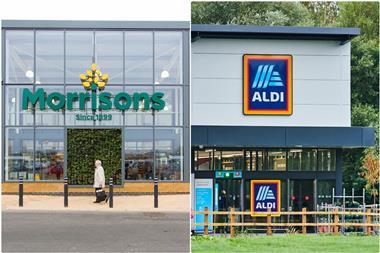
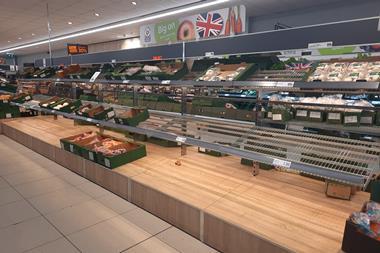
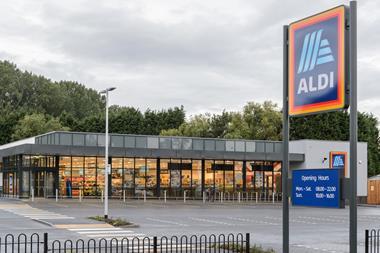
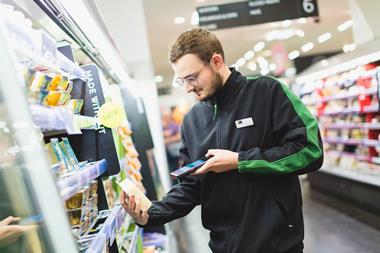




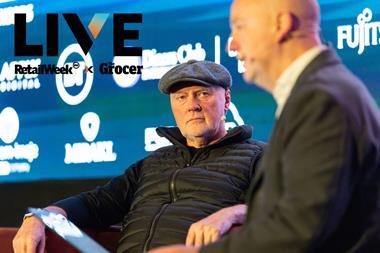
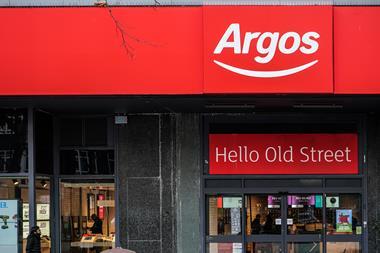
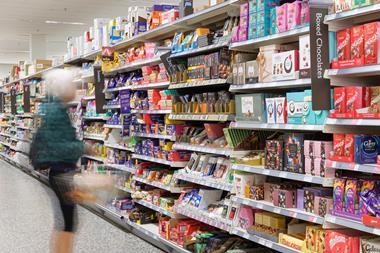
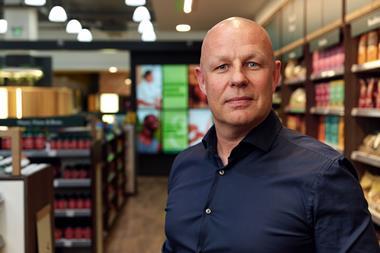
No comments yet